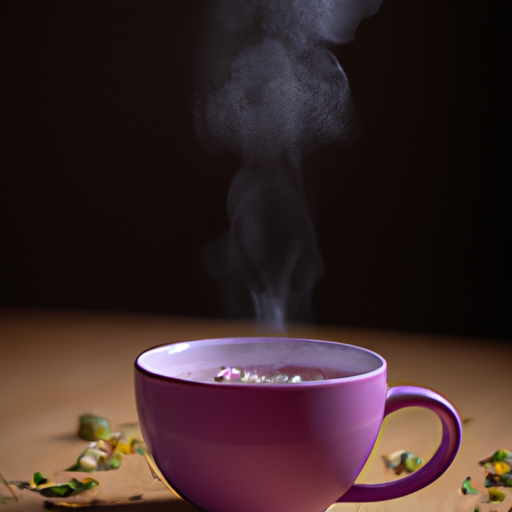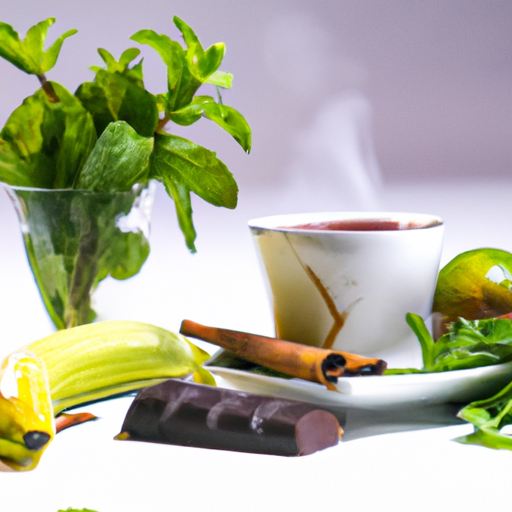Are you fed up with the constant pain and discomfort caused by inflammation? Well, I have exciting news for you! There is an easy and natural solution that can alleviate your symptoms and improve your overall health.
Introducing herbal teas, a powerful and effective way to combat inflammation. These miraculous brews are not only delicious, but they also possess incredible anti-inflammatory properties. With a wide range of options to choose from, finding the perfect herbal tea for your needs has never been easier.
From the soothing and calming effects of chamomile tea to the invigorating and spicy kick of ginger tea, there is a herbal tea out there that will suit your taste buds and provide you with the relief you deserve.
So why suffer in silence when you can sip your way to a healthier, inflammation-free life? Join me as we explore the top herbal teas that can help combat inflammation and restore balance to your body.
Key Takeaways
- Chamomile tea has anti-inflammatory properties and promotes relaxation and stress reduction.
- Ginger tea is a powerful remedy for inflammation and provides relief for joint and muscle pain.
- Turmeric tea, with its active compound curcumin, has powerful anti-inflammatory effects, improves mobility, and enhances immune function.
- Green tea is rich in antioxidants and catechins, has anti-inflammatory properties, and aids in weight loss.
Chamomile Tea
If you’re looking for a soothing and natural way to combat inflammation, chamomile tea is a fantastic choice. It’s derived from the chamomile plant, which has been used for centuries for its medicinal benefits. This herbal tea is known for its ability to reduce inflammation and promote relaxation.
One of the key benefits of chamomile tea is its ability to calm the body and reduce stress, which can be a major trigger for inflammation. Additionally, chamomile tea contains compounds called flavonoids, which’ve been shown to have anti-inflammatory effects.
To enjoy the benefits of chamomile tea, you can simply steep a chamomile tea bag in hot water for a few minutes. You can also experiment with chamomile tea recipes, such as adding honey or lemon for added flavor.
Moving on to ginger tea, another great herbal remedy for inflammation.
Ginger Tea
Ginger tea is a fantastic herbal remedy that offers powerful anti-inflammatory effects. It’s been shown to reduce inflammation in the body, making it a great option for those dealing with conditions such as arthritis or chronic pain.
Additionally, ginger tea can provide relief for joint and muscle pain. It helps to alleviate discomfort and improve overall mobility.
Powerful Anti-Inflammatory Effects
Turmeric, with its vibrant golden color and powerful anti-inflammatory effects, is an excellent herbal tea choice for reducing inflammation. It’s one of nature’s most potent natural remedies and has been used for centuries to treat a variety of ailments. Turmeric’s active compound, curcumin, has been extensively studied for its numerous health benefits. Research has shown that curcumin can help reduce inflammation by blocking certain molecules that play a role in the inflammatory process.
This makes turmeric tea a great option for those looking for a natural way to alleviate inflammation. However, turmeric tea isn’t just limited to reducing inflammation. It also offers relief for joint and muscle pain, making it a versatile and effective herbal tea option for overall well-being.
Relief for Joint and Muscle Pain
Not only does turmeric tea offer powerful anti-inflammatory effects, but it also provides much-needed relief for joint and muscle pain. Turmeric, a spice commonly found in curry dishes, has been used for centuries in traditional medicine to treat various ailments. Its active compound, curcumin, has been extensively studied for its potent anti-inflammatory properties.
When consumed as a tea, curcumin is easily absorbed by the body, allowing it to target inflammation in the joints and muscles. This natural remedy has gained popularity as an alternative therapy for those seeking relief from chronic pain. Research suggests that turmeric tea can reduce pain and improve mobility in individuals with conditions such as arthritis and fibromyalgia.
By incorporating turmeric tea into your daily routine, you can harness the power of this herbal remedy to alleviate joint and muscle discomfort.
Transitioning into the subsequent section about turmeric tea, let’s explore the various ways to prepare and enjoy this beneficial beverage.
Turmeric Tea
Additionally, research has shown that turmeric tea can help reduce inflammation. One study found that regular consumption of turmeric tea led to a 50% decrease in inflammatory markers. Turmeric, a spice commonly used in Indian cuisine, contains a compound called curcumin, which has powerful anti-inflammatory properties. When brewed into a tea, the curcumin is released, allowing for better absorption by the body.
Some benefits of turmeric tea include:
-
Reduced joint pain: Studies have shown that turmeric tea can help alleviate joint pain and stiffness, making it a great option for those suffering from arthritis or other inflammatory joint conditions.
-
Improved digestion: Turmeric tea has been found to stimulate the production of bile, which aids in the digestion of fats. This can help relieve symptoms of indigestion and promote overall digestive health.
-
Enhanced immune function: The anti-inflammatory properties of turmeric tea can help boost the immune system, making it more resistant to infections and diseases.
Transitioning into the subsequent section about green tea, it’s important to explore other herbal teas that can also provide relief from inflammation.
Green Tea
Moving on from the discussion on Turmeric Tea, let’s now explore the benefits of Green Tea.
As someone who’s passionate about natural remedies, I find it fascinating to learn about the healing properties of different herbal teas. Green tea, in particular, has been widely studied for its numerous health benefits.
Not only is it rich in antioxidants, which help protect the body from inflammation, but it also contains compounds like catechins that have anti-inflammatory properties. Additionally, green tea has been associated with weight loss due to its ability to boost metabolism and increase fat burning.
It’s important to note that while green tea can be a valuable addition to a healthy lifestyle, it shouldn’t be relied upon as the sole solution for inflammation or weight loss.
Now, let’s delve into the next section, where we’ll explore the wonders of Peppermint Tea.
Peppermint Tea
Peppermint tea, with its refreshing flavor and soothing properties, has long been enjoyed for its potential health benefits. Not only does it taste great, but it also offers a wide range of benefits for inflammation. Here are a few reasons why peppermint tea is a good choice:
-
Peppermint tea has anti-inflammatory properties that can reduce inflammation in the body, making it an excellent choice for those dealing with chronic inflammation.
-
It can also act as a digestive aid, soothing an upset stomach and relieving bloating, which are common symptoms of inflammation in the digestive system.
-
Drinking a warm cup of peppermint tea can promote relaxation and reduce stress, which can contribute to inflammation.
To make peppermint tea, simply steep a peppermint tea bag or a teaspoon of dried peppermint leaves in hot water for about 5 minutes. Then, remove the tea bag or strain the leaves and enjoy!
Now, let’s move on to the next herbal tea, rosehip tea.
Rosehip Tea
Rosehip tea, with its tangy flavor and potential health benefits, is a delightful choice for those seeking a refreshing and soothing beverage. This herbal tea is derived from the fruit of the rose plant and is rich in antioxidants, vitamins, and minerals. A study published in the Journal of Science and Food Agriculture found that rosehip tea has anti-inflammatory properties, which may help reduce inflammation in the body. Additionally, it may also aid in strengthening the immune system and promoting healthy digestion. However, it is important to note that rosehip tea may have some side effects, such as stomach upset or diarrhea, if consumed in excessive amounts. As with any herbal remedy, it is advisable to consult with a healthcare professional before incorporating rosehip tea into your routine. Moving on to echinacea tea, another herbal option for inflammation relief.
Echinacea Tea
Now, let’s move on to another herbal tea that’s known for its potential benefits in reducing inflammation: Echinacea tea. Echinacea, also known as purple coneflower, has been used for centuries in traditional medicine to support the immune system and as a natural remedy for various ailments.
Echinacea tea is made from the dried leaves, flowers, and roots of the plant. Some potential benefits of echinacea tea include its anti-inflammatory properties, which may help reduce inflammation in the body. It’s also believed to have immune-boosting effects, helping to strengthen the body’s natural defenses.
To prepare echinacea tea, start by boiling water and then steeping a teaspoon of dried echinacea in a cup of hot water for about 10 minutes. You can add honey or lemon to enhance the taste if you’d like. Remember to consult with a healthcare professional before incorporating echinacea tea into your routine, especially if you have any underlying health conditions or are taking medications.
Incorporate echinacea tea into your wellness routine and enjoy its potential benefits for inflammation and immune support.
- Anti-inflammatory properties
- Immune-boosting effects
- Traditional remedy
- Supports the immune system
- Natural remedy for various ailments
Frequently Asked Questions
Can herbal teas completely cure inflammation?
Herbal teas can help reduce inflammation, but they cannot completely cure it. While some herbal teas have anti-inflammatory properties, they should not replace medication for inflammation. It’s important to consult a healthcare professional for proper treatment.
Are there any side effects of drinking herbal teas for inflammation?
Drinking herbal teas for inflammation has potential risks and may interact with medications. It’s important to be aware of these side effects and consult with a healthcare professional before incorporating herbal teas into your routine.
Can I drink multiple types of herbal teas for inflammation at the same time?
Yes, you can drink multiple types of herbal teas for inflammation at the same time. Combining different herbal teas can enhance their individual benefits and provide a more comprehensive approach to reducing inflammation in the body.
How long should I drink herbal teas for inflammation to see results?
For optimal results, it is recommended to drink herbal teas for inflammation daily. The duration varies, but noticeable improvements can typically be seen within a few weeks. Mornings and evenings are the best times to consume herbal teas for maximum benefits.
Are there any precautions or contraindications for drinking herbal teas for inflammation?
Are there any precautions or contraindications to consider when drinking herbal teas for inflammation? It’s important to be aware of potential allergies, drug interactions, and the recommended dosage for each specific herb.
Conclusion
After exploring various herbal teas, it’s clear that there are several options that can help with inflammation.
Chamomile tea, with its soothing and anti-inflammatory properties, is a great choice for relaxation and reducing inflammation.
Ginger tea is known for its powerful anti-inflammatory and pain-relieving properties, making it an excellent option for those dealing with joint pain.
Turmeric tea, with its active compound curcumin, has been shown to have strong anti-inflammatory effects.
Green tea, peppermint tea, rosehip tea, and echinacea tea also offer potential benefits for reducing inflammation.
So, next time you’re looking to soothe your inflamed body, grab a cup of herbal tea and let nature work its magic.










